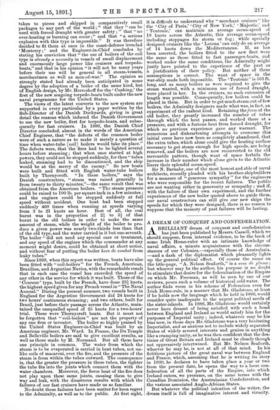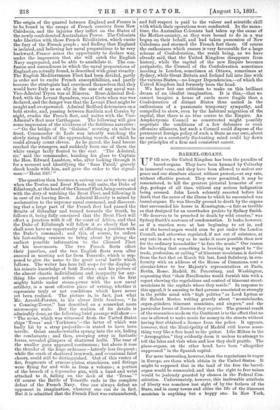A DREAM OF CONQUEST AND CONFEDERATION.
ABRILLIANT dream of conquest and confederation has just been published by Messrs. Cassell, which we should suppose, from internal evidence, to be the book of some Irish Home-ruler with an intimate knowledge of naval affairs, a minute acquaintance with the circum- stances of our Colonies,—especially those of Australasia, —and a dash of the diplomatist which pleasantly lights up the general political effect. Of course the name on the title-page, "A. Nelson Seaforth," is a nom de plume ; but whoever may be the author, his purpose is no doubt to stimulate that desire for the federalisation of the Empire on which Mr. Freeman, as will be seen by one of our reviews, pours such a volume of historical cold water. The author finds room in his scheme of Federation even for Irish Home-rule, in a manner that Mr. Gladstone, at least if he holds now the language which he held in 1886, would consider quite inadequate to the urgent political needs of the sister-islands. In 1886, Mr. Gladstone would certainly never have dreamt of being satisfied with such a bond between England and Ireland as would satisfy him for the purposes of Imperial unity ; indeed, whatever may be his bias now, in those days Mr. Gladstone was a very hesitating Imperialist, and as anxious not to include widely separated States of widely severed interests and genius in anything like a cramping unity, as he was then confident that the des- tinies of Great Britain and Ireland must be closely though not oppressively intertwined. But Mr. Nelson Seaforth, whoever he may be, is not at all of that mind. In his fictitious picture of the great naval war between England and France, which, assuming that he is writing its story in 1930, he declares to have taken place a year or two from the present date, he opens the way to a loose con- federation of all the parts of the Empire, into which Ireland enters, we presume, on the same terms with the Canadian Dominion, the Australasian Confederation, and the various associated Anglo-African States. But whatever the political intention of the writer, the dream itself is full of imaginative interest and vivacity. The origin of the quarrel between England and France is to be found in the escape of French convicts from New Caledonia, and the injuries they inflict on the States of the newly confederated Australasian Power. The Colonists take liberties with these French Recidivistes, which excite the fury of the French people ; and finding that England is isolated, and believing her naval preparations to be very backward, France seizes the opportunity to declare war, under the impression that she will catch the English Navy unprepared, and be able to annihilate it. The con- fusion and unreadiness in which the naval preparations of England are actually found, is described with great vivacity. The English Mediterranean Fleet had been divided, partly in order not to excite French susceptibilities, and partly because the strategists had convinced themselves that they would have Italy as an ally in the case of any naval war. Vice-Admiral Tryon was at Minorca. Rear-Admiral Bed- ford, with the Levant Squadron, was at Crete when war was declared, and the danger was that the Levant Fleet might be caught and overpowered. Admiral Bedford determines on a bold stroke, and, passing between Sardinia and Corsica by night, evades the French fleet, and unites with the Vice- Admiral's fleet near Carthagena. The following will give some impression of the vividness of the fictitious narrative : —" On the bridge of the 'Galatea' scouting six miles in front, Commander de Lisle was intently watching the slowly rising hulls of the approaching vessels, of which he could already count eleven. As he gazed, the land breeze reached the strangers, and suddenly from one of them the white ensign lazily floated to the east. The Admiral, sir,' said the commander, handing his glass to Captain • the Hon. Edward Lambton, who, after looking through it for a moment and identifying the Sans Pareil,' gravely shook hands with him, and gave the order to the signal- man= Hoist 849? "
The question then becomes a serious one as to where and when the Toulon and Brest Fleets will unite, the Duke of Edinburgh, at the head of the Channel Fleet, being entrusted • with the duty of watching the Brest Fleet, and following it in case of its leaving Brest. Admiral Hornby is raised by • acclamation to the supreme naval command, and discover- ing that a large part of the French fleet had passed the Straits of Gibraltar and turned towards the South, he follows it, being fully convinced that the Brest Fleet will effect a junction with it off the coast of Africa, and that the Duke of Edinburgh will follow it so closely that he shall soon have an opportunity of effecting a junction with the Duke's command ; and this, of course, he orders his fast-sailing cruisers to bring about by giving the earliest possible information to the Channel Fleet of his movements. The two French fleets effect .their junction, and the two English fleets soon after .succeed in meeting not far from Teneriffe, which is sup- posed to give the name to the great naval battle which follows. The writer has here full scope for the display of his minute knowledge of both Navies ; and his picture of the almost chaotic individualism and incapacity for any- thing like concerted action of the ships in the first mighty battle under steam-power with the new naval artillery, is a most effective piece of writing, whether it represents truly or not conditions which have never yet been realised. The picture is, in fact, just what Mr. Arnold-Forster, in his clever little brochure, "In a Conning-Tower," has described on a somewhat more microscopic scale. But the realism of its details is admirably done, as the following brief passage will show :-- "The scene, which was witnessed from the United States ships 'Texas' and Yorktown '—the latter of which was badly hit by a stray projectile—is stated to have been terrific. Great smoke-wreaths sprang into the air, hiding the combatants ; and then, sweeping away in fantastic forms, revealed glimpses of shattered hulls. The roar of the smaller guns appeared continuous ; but above it rose the thunder of the huge ordnance—latterly less frequent ; while the crash of shattered ironwork, and occasional faint cheers, could still be distinguished. Out of this vortex of fire, fragments of armour-plates, stanchions, and fittings were flying far and wide as from a volcano ; a portion of the breech of a 6-pounder gun, with a hand and wrist attached to it, falling on the deck of the 'Texas." Of course the Battle of Tenerife ends in the complete defeat of the French Navy. One can always defeat an opponent in imagination, whatever one can do in fact. But it is admitted that the French Fleet was outnumbered, and full respect is paid to the valour and scientific skill with which their operations were conducted. In the mean- time, the Australian Colonists had taken up the cause of the Mother-country, as they were bound to do in a, war begun on their behalf, and had taken possession of New Caledonia. and stormed the French fort there. Of course the enthusiasm which ensues is very favourable for a large scheme of Confederation, the result being, as we have already said, that the United Kingdom disappears from history, while the capital of the new Empire becomes peripatetic, the Council of the Confederation sometimes meeting in London, sometimes at Ottawa, sometimes at Sydney, while Great Britain and Ireland fall into line with the various States,—no longer Dependencies,—of which the United Kingdom had formerly been the head. We have but one criticism to make on this brilliant dream of an idealist imagination. It is this,—that we cannot imagine a house of cards more fragile than a Confederation of distant States thus united in the enthusiasm of a passionate temporary sympathy, and compelled to show, even by the habitual migration of the capital, that there is no true centre to the Empire. An Amphictyonic Council so constructed might possibly negotiate the conditions of a few defensive or even offensive alliances, but such a Council could dispose of the permanent foreign policy of such a State as our own, about as easily as a constantly fluctuating mind could lay down the principles of a firm and consistent career.



































 Previous page
Previous page